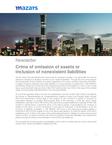
Crime of omission of assets or inclusion of nonexistent liabilities
This criminal regulation differs from the one established in the bill number 168 of 2016, submitted to the House of Representatives by Congresswomen Angélica Lozano and Claudia López through which the autonomous criminal type of "tax evasion of (sic) omission of assets or inclusion of nonexistent liabilities" is created. Both projects differ in the following: i) while the reform article establishes a penalty of 48 to 108 months, the autonomous project establishes a penalty of 96 to 168 months of imprisonment, ii) while the crime, in the reform project, is generated by the omission of assets for any value, or by the commission of any type of inaccuracy in its declaration, or by the inclusion of liabilities exceeding 7. 250 SMLMV, the crime in the autonomous project applies a threshold of 100 minimum wages for any of the above assumptions, iii) while the article of the reform establishes a fine of 20% of the value of the unduly declared asset or liability, the autonomous project raises it to 30%, iv) while the article of the reform is limited to income tax affectation, the autonomous project extends its effects to the affectation of the CREE and wealth tax.
The coexistence of both projects is incompatible, which is why it is likely that one of them will be filed and the other will be submitted for debate and vote.
The creation of this crime is highly inconvenient and worrisome, since it does not obey a serious and coherent purpose, nor is it the result of a dogmatic and criminal policy study, as any rule that affects the physical freedom of people in society must be.
In the first place, it penalizes the omission of any asset and the inaccuracy in its declaration. To be exact, in the framework of an inaccurate tax system, the result of a highly inaccurate tax reform where there are contradictory rules among them and rules whose validity is created in the body of the reform and then repealed in its repealing section, is to penalize the inducement in error that the State itself promotes. Likewise, it makes no sense whatsoever that the omission of any asset (regardless of its value) or the inaccuracy in its declaration can be penalized with up to 108 months of imprisonment, when the penalty for the inclusion of liabilities requires that these have an amount greater than 7,250 SMLMV.
Secondly, it is not understood -from the point of view of criminal policy- how a conduct that has been legitimized by the State itself can be criminally sanctioned. That is to say, if today (and until 2017 -unless the norm is repealed in the reform process-) there is a tax on tax normalization that taxes the omission of assets and the inclusion of non-existent liabilities, and that obliges those who have omitted assets and non-existent liabilities to pay 11.5% or 13% (years 2016 and 2017, respectively) of their value, how is it possible that the same State prosecutes and penalizes -in the fiscal year 2017- those who legitimately intend to pay this tax? In the same sense, whoever is accused of this crime in the year 2017, can perfectly proceed to pay the tax normalization tax (13% of the value of the omitted asset or of the nonexistent liability) and thus extinguish the criminal action. Is that really what the State is looking for?
This issue, as all others related to the tax reform, requires a deep analysis by Congress. To pretend to modify the economic system of a country -where all sectors are affected without any exception- without a deep and transversal debate will only generate the responsibility of the State for the legislator's actions, when the Constitutional Court begins to declare the unenforceability of all the norms that violate the Constitution.


